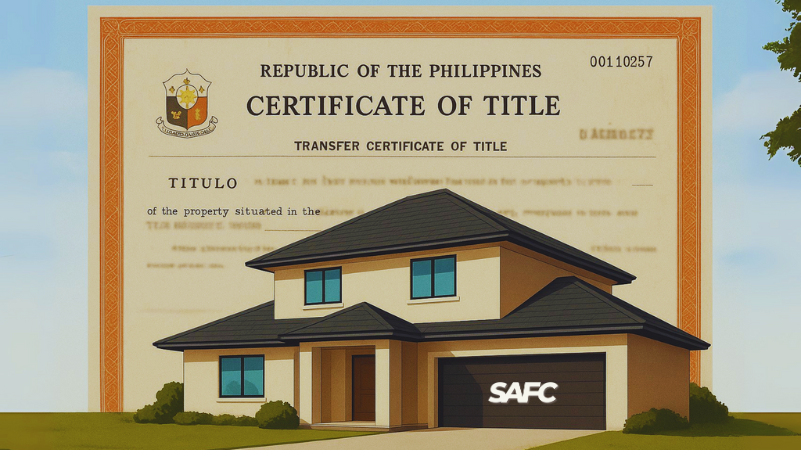Sangla Titulo remains one of the most practical ways to unlock bigger financing without parting with your property. By using a land or house title as collateral, you can access higher loan amounts and more manageable rates while keeping your ownership intact.
Many Filipinos turn to Sangla Titulo for urgent financial needs, business expansion, or debt consolidation—situations where fast and flexible funding matters most. This guide explains how Sangla Titulo works, the process, benefits and risks to consider, and how to make smart decisions with the help of trusted lenders like SAFC.
What is Sangla Titulo? (Clear Definition)
Sangla Titulo is a type of secured loan in the Philippines where you use your land or house title as collateral to access funds. Since the loan is backed by your property, lenders are often able to offer higher loan amounts and more affordable rates compared to unsecured loans.
The good news is that you don’t lose ownership of your property. The lender only holds the title as security while your loan is active. Once you’ve completed the repayment, the lien is removed, and your title is released—restoring your full control and rights over the property.
Why Choose Sangla Titulo Over Unsecured Loans?
If you’re deciding between a secured loan like Sangla Titulo and an unsecured loan, here’s why many property owners prefer the former:
- Higher Loanable Amount – The value of your land or house title often allows you to borrow much more compared to personal or salary loans.
- Lower Interest Rates – Because your loan is backed by collateral, lenders see less risk and can offer more affordable terms.
- You Keep Ownership – Your property remains under your name. The title is only placed under lien as security, and full control is returned once you’ve settled the loan.
Tip: Want to understand more loan-related terms? Visit our Loan Glossary for a quick guide to common lending jargon.
Legal Basis of Sangla Titulo in the Philippines

One of the most common questions from borrowers is: “Is Sangla Titulo legal in the Philippines?” The answer is yes—as long as it follows the country’s laws on real estate mortgages. Knowing the legal framework not only gives you peace of mind but also ensures that the transaction is safe, valid, and enforceable.
Key Laws Governing Sangla Titulo
- Civil Code, Article 2085 – States the requirements of a valid mortgage, including that the borrower must be the absolute owner of the property and have the legal capacity to contract.
- Presidential Decree (PD) 1529 or the Property Registration Decree – Requires mortgages to be annotated in the Registry of Deeds where the property is registered, ensuring transparency and protecting both the borrower and the lender.
- Act No. 3135 – Provides the rules on extrajudicial foreclosure of real estate mortgages and grants borrowers the right of redemption, meaning they can reclaim their property after foreclosure by paying the amount due within the redemption period.
Who Regulates Sangla Titulo?
- Banks – Supervised by the Bangko Sentral ng Pilipinas (BSP).
- Financing and Lending Companies – Regulated by the Securities and Exchange Commission (SEC).
Bottom Line
Yes, Sangla Titulo is legal in the Philippines. As long as the transaction complies with the Civil Code, PD 1529, and Act 3135, borrowers are protected by law and lenders must observe proper processes.
Step-by-Step Process: How Sangla Titulo Works

Here’s a straightforward guide on how Sangla Titulo loans are processed in the Philippines. Each step is in place to safeguard both the borrower and the lender, while ensuring the agreement is properly documented and legally binding.
Step 1: Application and Initial Screening
You start by submitting the required documents—valid IDs, proof of income, and your property’s Transfer Certificate of Title (TCT). The lender reviews these papers to confirm eligibility.
Step 2: Property Appraisal
The property undergoes appraisal to determine its fair market value. Factors such as location, lot size, improvements, comparable sales in the area, and the BIR’s zonal value are taken into account. This step ensures the loan amount reflects the true worth of your property.
Step 3: Loan Offer and LTV Ratio
Once the appraisal is complete, the lender presents a loan offer. The loanable amount usually ranges from 50-80% of the property’s appraised value, depending on the Loan-to-Value (LTV) ratio. This safeguards the lender while still providing borrowers with significant funding.
Step 4: Registry of Deeds Annotation
When terms are accepted, the mortgage is formally recorded at the Registry of Deeds through an annotation on the property title. This step protects the lender’s claim while allowing the borrower to keep ownership of the property.
Step 5: Loan Release and Repayment
After the annotation, funds are released via bank transfer or check. The loan contract outlines repayment terms, interest rates, and penalties. Following the agreed schedule is crucial to avoid added costs or the risk of foreclosure.
Sangla Titulo Loan Requirements

Before applying for a Sangla Titulo loan, it’s important to prepare all the necessary documents. Having complete requirements not only makes the process faster but also shows lenders that you’re a reliable borrower. This can help you get approved more smoothly and even secure better loan terms.
Basic Requirements for All Borrowers
- Valid government-issued IDs (borrower and spouse, if married)
- Original Transfer Certificate of Title (TCT) or Condominium Certificate of Title (CCT)
- Latest Tax Declaration
- Updated Real Property Tax Receipts
- Proof of income (such as payslips, Certificate of Employment, or bank statements)
- Vicinity map showing your property’s location
Additional Requirements for Business Owners
- DTI Business Registration (for sole proprietors)
- Mayor’s Permit or Business Permit
- Latest three (3) months bank statements
Tip: Complete requirements speed up approval and may help you secure better loan terms.
How Lenders Value Your Property

One of the biggest factors in a Sangla Titulo is how much your property is worth. Lenders don’t just rely on what you declare—they use professional appraisal methods to determine its fair market value before deciding how much they can lend you.
Common Property Appraisal Methods
- Comparative Market Approach
Lenders look at the selling prices of similar properties in your area. For example, if nearby houses with the same lot size and location sold for around ₱2M, your property will likely be valued within that range. - Cost Approach
This method calculates the costs to rebuild your property from the ground up, factoring in construction costs, labor, and depreciation. It’s often used for unique or custom properties without many direct comparisons. - Income Approach
If your property generates income (like apartments or commercial spaces), lenders may assess its value based on projected rental income. While less common for residential homes, this is crucial for properties with strong business use.
Philippine-Specific Valuation References
Apart from standard appraisal methods, lenders in the Philippines also consider:
- BIR Zonal Value – The minimum declared value used by the Bureau of Internal Revenue for taxation.
- LGU Assessor’s Value – The property value set by the local government for tax assessment.
- Bank or Lender’s Internal Appraisal – Often more aligned with real market trends, this gives a more updated picture of your property’s worth.
Typical Loan-to-Value (LTV) Ratios
Even if your property is valued at ₱2M, lenders usually won’t release the full amount. Instead, most Sangla Titulo loans in the Philippines use an LTV ratio of 50-80%. That means you may qualify for anywhere between ₱1M to ₱1.6M, depending on the lender’s risk assessment and your financial profile.
Tip: Properties in prime locations or with high demand often secure better valuations and higher loan offers.
If you’re ready to see how much you can borrow with your property title, start your journey today. Inquire for a Sangla Titulo loan with SAFC and get a fair, transparent valuation from a trusted financing partner.
Interest Rates, Fees & Sample Computation

When exploring how Sangla Titulo works, one of the most important things to understand is the true cost of borrowing. It’s not just about the loanable amount — you also need to consider interest rates, fees, and deductions that directly affect how much cash you’ll actually receive.
Typical Interest Rates
- Banks & Formal Lenders – Typically 1.5% to 2% monthly add-on, with stricter requirements but higher security and legal protection.
- Non-bank & Private Lenders – More flexible terms, faster approvals, and customized loan arrangements, but often with higher rates or shorter terms.
Common Fees You Should Expect
Borrowers should prepare for standard charges, including:
- Documentary Stamp Tax (DST) – Mandatory government tax on loan agreements.
- Registry of Deeds Annotation Fees – For recording the mortgage on your land title.
- Appraisal Fee – To determine your property’s fair market value.
- Processing Fees – Lender-specific charges for handling your application.
Sample Computation (₱2M Property, 60% LTV)
Here’s an example of how interest and fees affect the actual loan proceeds:
| Computation | Amount (₱) |
| Appraised Value of Property | 2,000,000 |
| Loanable Amount (60% LTV) | 1,200,000 |
| Less: Appraisal Fee | -5,000 |
| Less: Processing Fee | -10,000 |
| Less: DST & Annotation Fees | -15,000 |
| Net Cash You Receive | 1,170,000 |
| Monthly Amortization (24 mos @ 1.5%) | ~58,500 |
Tip: Always request a detailed loan computationbefore signing, so you’ll know exactly how much you will receive after deductions.
Risks and Borrower Rights

Understanding how Sangla Titulo works also means knowing both the potential risks and your legal rights as a borrower. While this type of loan gives you fast access to funds, it’s equally important to be aware of what happens if payments are delayed or missed.
The Risk of Default
If you fail to repay your loan, lenders have the legal right under Act 3135 to foreclose on your property. Foreclosure means the lender can sell your house or land title to recover the unpaid balance. In short, missing several payments may eventually cost you ownership of your property—making on-time payments crucial.
Borrower Rights You Should Know
The law still provides borrowers with protections to ensure fair treatment. Here are key rights every Sangla Titulo borrower should know:
| Borrower Right | What It Means for You |
| Notice Requirement | You must receive a formal notice before foreclosure proceedings can start. |
| Redemption Period | You’re given a grace period (commonly 1 year in judicial cases) to settle your debt and prevent the sale. |
| Right to Reclaim | Once your loan is fully paid, the lender must return your property title without delay. |
Watch Out for Red Flags
Not all lenders operate fairly. Protect yourself by avoiding:
- Lending scams that ask for upfront fees.
- Vague or hidden charges.
- Loan terms that sound “too good to be true.”
Tip: Always review your contract carefully and work only with licensed, reputable lenders.
Final Word: Stay Protected, Borrow with Confidence
While Sangla Titulo loans carry risks, understanding your rights can help you make smarter and safer decisions. Partnering with a trusted institution like SAFC ensures you get transparent terms and reliable service.
Frequently Asked Questions
If you’re new to Sangla Titulo and want a clearer picture of how it works, here are the most common questions Filipino borrowers ask — answered in simple, practical terms.
1. Is Sangla Titulo legal in the Philippines?
Yes. Sangla Titulo is legal as long as it’s done through licensed lenders and follows Philippine lending laws. Your property title serves as collateral, which makes the agreement binding and transparent.
2. How much can I borrow with Sangla Titulo?
The loan amount depends on the appraised value of your property. Most lenders allow 50-80% of its fair market value.
Example: If your property is worth ₱2,000,000, you may qualify for a loan of ₱1,000,000 to ₱1,600,000.
3. What happens if I can’t pay my loan?
If you default, lenders may start foreclosure under Act 3135. This means your property could be auctioned to cover the balance.
However, you still have borrower rights:
- Advance notice before foreclosure
- Redemption period to settle and reclaim property
- Full return of your title once repayment is complete
4. How fast is Sangla Titulo approved?
Processing time varies, but SAFC can release funds within a few days once documents are verified. Many clients receive approval faster than typical bank loans.
5. Can I use a property with co-ownership?
Yes, but all co-owners must sign the agreement. Without the consent of everyone listed on the title, the loan cannot proceed.
6. Are Sangla Titulo loans better than personal loans?
It depends on what you need:
| Sangla Titulo Loan | Personal Loan |
| Higher loan amount (secured by property) | Lower loanable amount (unsecured) |
| Longer repayment terms | Shorter repayment terms |
| Slightly longer processing | Faster approval (same-day possible) |
If you need bigger funding for business, tuition, or debt consolidation, Sangla Titulo is usually the better choice. If you just need quick cash, a personal loan may fit better.
Conclusion: Making the Most of Sangla Titulo in the Philippines
The bottom line is this: Sangla Titulo loans offer fast access to bigger funding while letting you keep property ownership.Whether you’re expanding a small business, dealing with emergencies, or consolidating debts, this type of loan offers flexibility that personal loans can’t always match.
But remember—its true value depends on how you use it. Borrow only what you can repay, study the loan terms carefully, and always work with licensed, reputable financing institutions to protect both your property and financial future.




